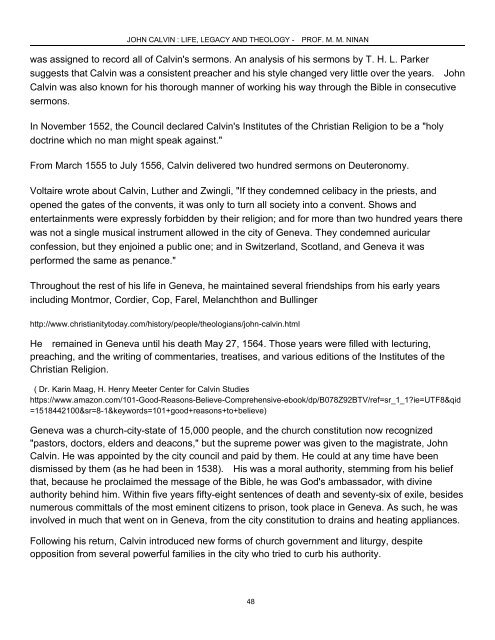Create successful ePaper yourself
Turn your PDF publications into a flip-book with our unique Google optimized e-Paper software.
JOHN CALVIN : LIFE, LEGACY AND THEOLOGY -<br />
PROF. M. M. NINAN<br />
was assigned to record all of <strong>Calvin</strong>'s sermons. An analysis of his sermons by T. H. L. Parker<br />
suggests that <strong>Calvin</strong> was a consistent preacher <strong>and</strong> his style changed very little over the years. <strong>John</strong><br />
<strong>Calvin</strong> was also known for his thorough manner of working his way through the Bible in consecutive<br />
sermons.<br />
In November 1552, the Council declared <strong>Calvin</strong>'s Institutes of the Christian Religion to be a "holy<br />
doctrine which no man might speak against."<br />
From March 1555 to July 1556, <strong>Calvin</strong> delivered two hundred sermons on Deuteronomy.<br />
Voltaire wrote about <strong>Calvin</strong>, Luther <strong>and</strong> Zwingli, "If they condemned celibacy in the priests, <strong>and</strong><br />
opened the gates of the convents, it was only to turn all society into a convent. Shows <strong>and</strong><br />
entertainments were expressly forbidden by their religion; <strong>and</strong> for more than two hundred years there<br />
was not a single musical instrument allowed in the city of Geneva. They condemned auricular<br />
confession, but they enjoined a public one; <strong>and</strong> in Switzerl<strong>and</strong>, Scotl<strong>and</strong>, <strong>and</strong> Geneva it was<br />
performed the same as penance."<br />
Throughout the rest of his life in Geneva, he maintained several friendships from his early years<br />
including Montmor, Cordier, Cop, Farel, Melanchthon <strong>and</strong> Bullinger<br />
http://www.christianitytoday.com/history/people/theologians/john-calvin.html<br />
He remained in Geneva until his death May 27, 1564. Those years were filled with lecturing,<br />
preaching, <strong>and</strong> the writing of commentaries, treatises, <strong>and</strong> various editions of the Institutes of the<br />
Christian Religion.<br />
( Dr. Karin Maag, H. Henry Meeter Center for <strong>Calvin</strong> Studies<br />
https://www.amazon.com/101-Good-Reasons-Believe-Comprehensive-ebook/dp/B078Z92BTV/ref=sr_1_1?ie=UTF8&qid<br />
=1518442100&sr=8-1&keywords=101+good+reasons+to+believe)<br />
Geneva was a church-city-state of 15,000 people, <strong>and</strong> the church constitution now recognized<br />
"pastors, doctors, elders <strong>and</strong> deacons," but the supreme power was given to the magistrate, <strong>John</strong><br />
<strong>Calvin</strong>. He was appointed by the city council <strong>and</strong> paid by them. He could at any time have been<br />
dismissed by them (as he had been in 1538). His was a moral authority, stemming from his belief<br />
that, because he proclaimed the message of the Bible, he was God's ambassador, with divine<br />
authority behind him. Within five years fifty-eight sentences of death <strong>and</strong> seventy-six of exile, besides<br />
numerous committals of the most eminent citizens to prison, took place in Geneva. As such, he was<br />
involved in much that went on in Geneva, from the city constitution to drains <strong>and</strong> heating appliances.<br />
Following his return, <strong>Calvin</strong> introduced new forms of church government <strong>and</strong> liturgy, despite<br />
opposition from several powerful families in the city who tried to curb his authority.<br />
48

















